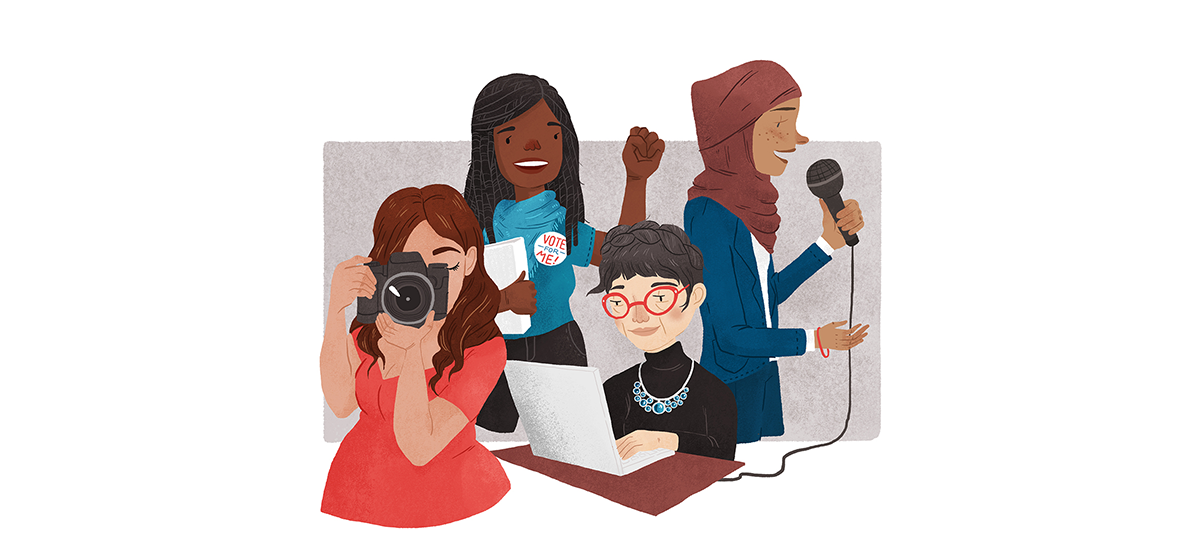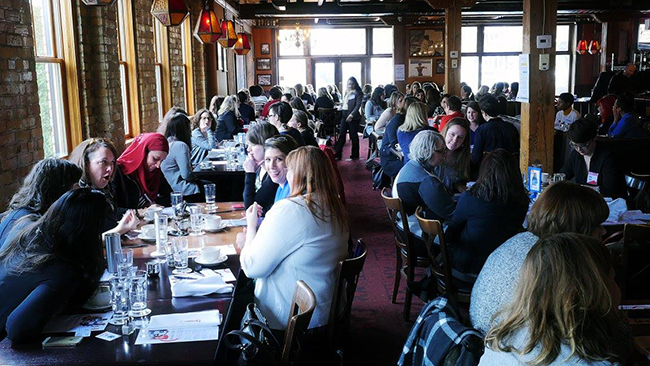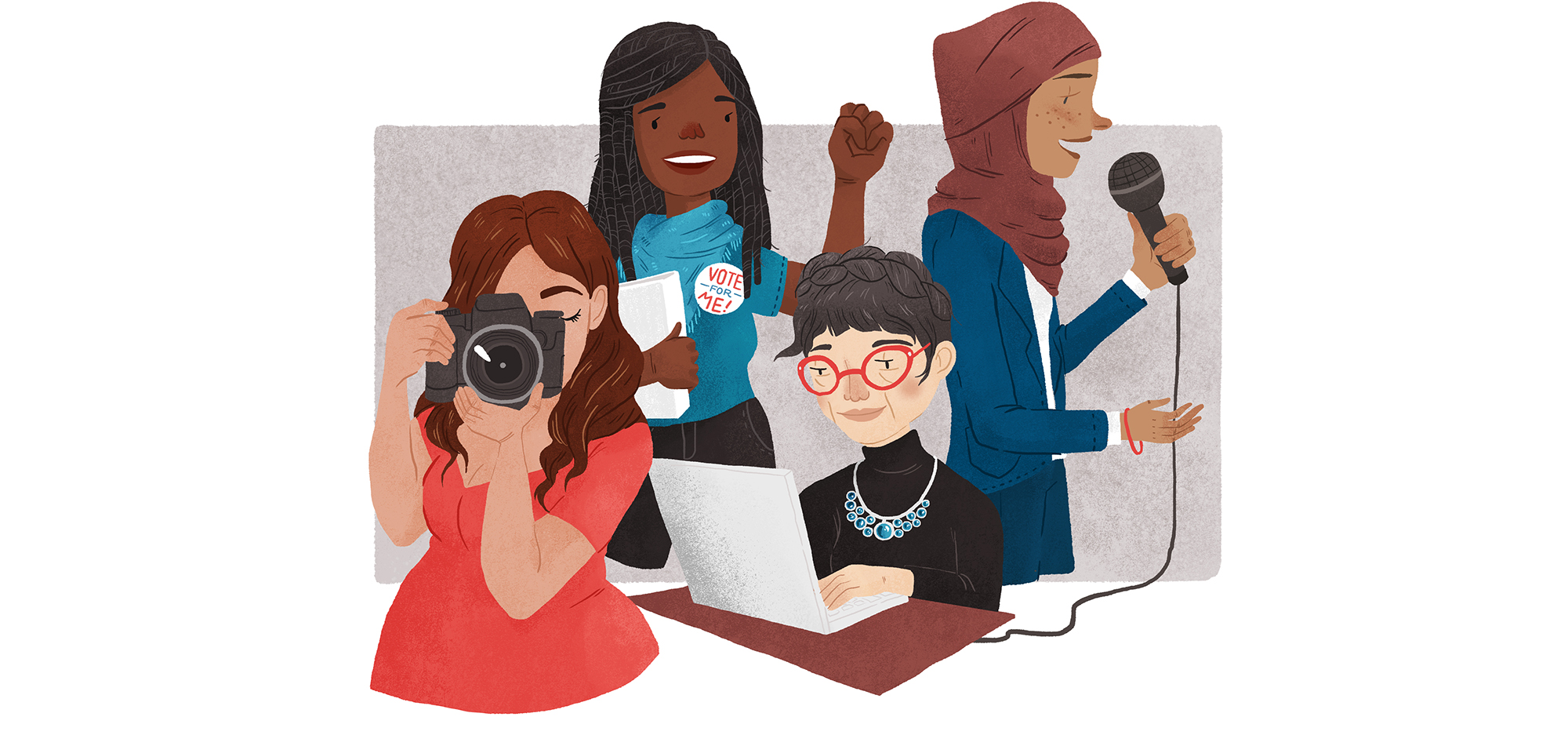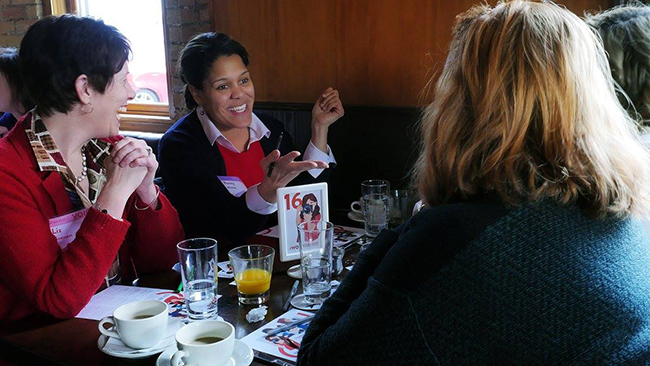
On February 18, 2016, Pollen kicked off its 2016 Work Redux series with a sold-out breakfast event at the Red Stag Supperclub in Northeast Minneapolis. Work Redux examines the shifts and evolutions that are happening in the workplace as experienced and creative women step into leadership positions.
For Work Redux | Voice, Pollen invited six dynamic female Twin Cities leaders to talk about how they use their voices to raise a ruckus, imagine new worlds, give others a boost, and ask hard questions.
T H E V O I C E S
As the audience noshed on hash browns and strong coffee, they got inspiration from poet Saymoukda Duangphouxay Vongsay who kicked things off with some verse.
An opening note about “voice” from
MEGHAN MURPHY
By morning’s end, we were reminded that flexing our voices isn’t always about talking. It also means noticing who isn’t being heard and who doesn’t have a seat at the table and bringing those people along.
Here’s a glimpse at the glorious voices who graced us with their presence.
JEN SWANSON
Jen is the director of digital marketing at Children’s Hospitals and Clinics of Minnesota. Five years ago when she was working at Capella University, Jen struggled to find her voice after a major promotion.
“Suddenly I was at the table for conversations where I did not understand one thing. I sat and I listened because I thought I needed to of take it in before I opened my mouth, but ten minutes in I’d be totally lost. After about a month, one of our C-level executives, who was a woman, pulled me aside and said: Jen we did not promote you to director to have you sit silently in meetings.
The next meeting I started asking questions. I oftentimes started those conversations with “help me understand,” or “I’m sorry if I missed this, but could you please go back?”
I know we’re told all the time how we’re not supposed to ask for help and we’re not supposed to say we’re sorry. I’m here to tell you that if you’re sorry, say you’re sorry. If you need help, ask for help.
Having that competence to ask questions really energized me. Now I’m on the quest to ask the perfect question.”
ADAOBI OKOLUE
Adaobi is the executive director and publisher at Twin Cities Media Alliance/Twin Cities Daily Planet. Adaobi encouraged the audience to ask: How are you receiving and interpreting the voices you hear?
“In my role at Twin Cities Media Alliance, our mission is to amplify and connect marginalized voices, but that wasn’t always the case. We always talked about a creating a space where a diversity of voices could exist. But as of last year, we really started saying: What does it mean? Who are we talking about?
We’re talking about those who don’t get a chance to be heard.
I challenge the room to think about how you are receiving and interpreting the voices you hear.
What filters is that going through? How are you building capacity for other voices to be in the room? When I say, ‘other voices,’ I don’t mean other voices that look just like you.”
MAYA BECK
Maya describes herself as a lapsed Muslim, a recovering otaku, a lover of wisdom, an arts nonprofit devotee, and a genre-blurring writer. Maya has been writing fantasy fiction since she was a teenager. Early on, she noticed that she was burying her own voice in subtle ways.
“When I was super young, I wanted to write the books I couldn’t find. I decided to write this epic multi-book series that had everything I loved in it. I realized that if you make a fantasy, you can choose who you want to represent. Why not dream about how I wanted the world to be set up?
I decided to take all these things that I loved, and I made the series, but I made the main character a little white boy. He was really easy to write, but I think it was a way of me denying my own voice.
I’ve learned from my fiction that I think about the world in ways I didn’t expect. The stuff that I can’t stop writing about, the issues that I try to correct when I write—that’s what’s important for me.
Embracing all of my different sides and connections with different people has been more freeing than trying to fit myself in a box of normality, or popularity, or hiding myself. I’ve gotten better at portraying myself, or should I say my selves.”
TERESA THOMAS
Teresa is a professional connector and the leader of MN Women in Networking (WIN). Teresa coaches other women to confidently raise their voices. Recently, she realized that she needed to turn the confidence mirror on herself.
“Confidence is something that I’ve always struggled with. I’ve always wanted to help other people with theirs. I serve mostly women. What I see time and time again is that sometimes women have a hard time doing something for themselves unless they realize it has a broader impact for other people.
So a big part of why I work on my own confidence is because I want to help other women step into having more confidence, having more of a voice, and having more of the type of life they want.
Our lives are short. We may as well speak up.”
SARAH WHITE
Sarah is a singer, emcee, photographer, and soundscape designer. As an artist and also as a parent, Sarah discovered the personal costs of filtering her voice. It’s a price she’s no longer willing to pay.
“My voice was always really big inside of my head and inside of my heart. It wasn’t until I was in high school that I realized my voice was different than the voices around me. I wasn’t your typical black girl. I was just a nerd. I loved it.
I realized my voice wasn’t being heard in the world in the way it was in my head. I started to think that maybe it was better if I quieted down a little bit so I didn’t stick out as much. I started to kind of filter my voice.
I moved to New York, which was great for me. I could be whoever I wanted, but I needed to make money, so I started to kind of shift my music and shift the way I express myself again to be profitable.
I realized that my daughters are mirroring me. If I’m filtering my voice, I’m teaching them to do the same.
I’m not filtering my voice anymore. It might not sound good to everybody, but my voice is who I am. It’s becoming more and more important that I’m really authentic with every single level and element that comes with me using it.”
NANCY LYONS
Nancy is the locally and nationally recognized owner and CEO of Clockwork where she works at the intersection of technology, community, and people. After years of not fitting in, Nancy learned to embrace her “weirdo” self, and she makes room for others to do the same.
“I have always been a giant weirdo. I was never anything I was supposed to be. I was never feminine enough. I wasn’t attracted to the right things. I wasn’t accepted by other girls. I wasn’t accepted by boys. I was a comic. I thought I was going to be funny for a living because if you’re a weirdo, what the hell else is there?
I was sort of lost for a while, and I grew up on my own. I decided that I was never going to be what anybody else wanted me to be. The only choice I had was to be exactly who I was and to love my weirdo.
When I decided to come to work and be exactly who I am—that’s when my life took off. That’s when I decided that I was never going to be judged by what I wore or by the fact that I’m a big girl. I would be judged by what I brought, and how I showed up, and who I brought with me.
It was about deciding what made me happy and what made me feel whole. I lead a charmed life as a total effing weirdo.”
***Written recap of interviews have been edited and condensed for clarity and summary***




